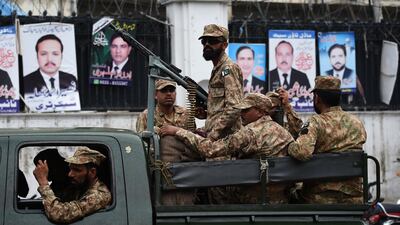If, as expected, Imran Khan and his Pakistan Tehreek-e-Insaf (PTI) party wins tomorrow’s election in Pakistan, it will represent a seismic break with 70 years of elections. Apart from brief periods, the country’s prime minister has always been drawn from one of two parties, either the Pakistan Muslim League-Nawaz (PML-N) or the Pakistan's People's Party (PPP).
Both of those parties are in retreat, with polls suggesting that support for the PML-N is declining while that for the PTI is rising. The two are neck-and-neck. The man most associated with the PML-N, the former prime minister Nawaz Sharif, is in prison; it is his brother Shehbaz who heads the party. The PPP's head is Bilawal Bhutto Zardari, not yet 30 years old and visibly straining under the weight of his family's legacy.
That leaves Khan, a former cricket star, the most charismatic speaker in Pakistani politics but one untested by high office. If he wins tomorrow, it would deliver an unprecedented outcome – a new ruling political party – and fragment the two-party system that has operated since independence.
Yet this breaking of the two-party stranglehold, while positive for Pakistan's democracy, could actually hand more power to the generals who, through the many years of martial law since independence, have held power for almost as long as civilians. It is they above all who stand to benefit from a fragmented political system.
To understand why, it is necessary to understand the role of “electables” in Pakistani politics.
The power of the two main parties has always been rooted in family dynasties, the Bhuttos at the PPP and the Sharifs at the PML-N. But the dynasties do not stand alone; they rely for support on other groups, usually other smaller dynasties, known as electables, who can deliver bloc votes. These electables stand as candidates in elections and bring out their supporters to vote for whichever party they ally with; often, they change parties.
Such patronage politics were brought into sharp focus when Khan, having founded the PTI in 1996 but struggled for years to make in-roads, admitted in the run-up to this election that he had used electables – an acknowledgement of the gritty reality of politics that appear to have brought him within touching distance of becoming prime minister.
The issue is that some electables have a long history with certain parties or candidates, effectively making them more like alliances and very hard to persuade to change parties. That gives political parties a particular cohesiveness, which can serve as a rival power bloc to the army.
But if Khan wins, or makes sufficient gains to enter power through a coalition, it could herald a breaking of the two-party system, which would create a rush for smaller political parties to gain votes by wooing electables.
That would give the army a significant amount of influence, because it could manipulate electables behind the scenes, choosing to boost certain parties or punish others. In that way, anything that weakens the two main parties would actually boost the power of the deep state.
The army has long played a role in Pakistani politics, sometimes behind the scenes, sometimes openly, running the country under General Zia ul-Haq from 1977 and again under Pervez Musharraf from 1999.
The power of the Pakistan military in politics rests on its reputation as the ultimate guarantor of stability in a country with relatively weak institutions. It remains popular with a section of the population, particularly the well-heeled middle class, for whom the rule of law matters a great deal. Whenever there is a feeling that the political class has overreached or is unable to handle a situation – particularly around domestic terrorism – there are calls for the army to intervene or lend a steadying hand.
This gives the army considerable leverage and civil and military relations are a cornerstone of participating in Pakistani politics. Politicians must handle the army, ensuring that they both court them by respecting their privileges, particularly their role in foreign policy, while also seeking to hold them at arm's length from the civilian administration.
The threat, always there in the background, is the possibility of an army coup. Although the army has stepped in several times, it is the decade of martial law under Zia ul-Haq that lingers most in the memory, a brutal decade that saw the prime minister Zulfikar Ali Bhutto, the father of Benazir, hanged in 1979.
Nawaz Sharif, who was removed as prime minister by the courts last year but remains hugely influential, has tangled with the army several times over a long career. He has been supported by them and toppled by them. There does appear to have been a targeting of PML-N members; arrests, sudden defections and media censorship. That has happened with other political parties too but it appears to have happened less with Khan's party. As always with such accusations, it can be hard to establish the facts.
Yet the army has little reason to pick a particular prime minister, as their sharpest critics allege. Rather, the army's intention is almost certainly to balance the PML-N with the PTI.
It is always in the army's interest to have rival political parties rather than one dominant one. With the PML-N's traditional opponents, the PPP, weakened, it is better for the generals to seek to build up a new rival rather than allow a powerful party to win power.
Khan has said that the best way to control the army is a strong civilian government. If he wins tomorrow, it is not immediately clear that his party could provide it. A pivotal election that could finally end the domination of two political parties might in fact simply hand more power to the unelected generals.
_________________
Read more:


